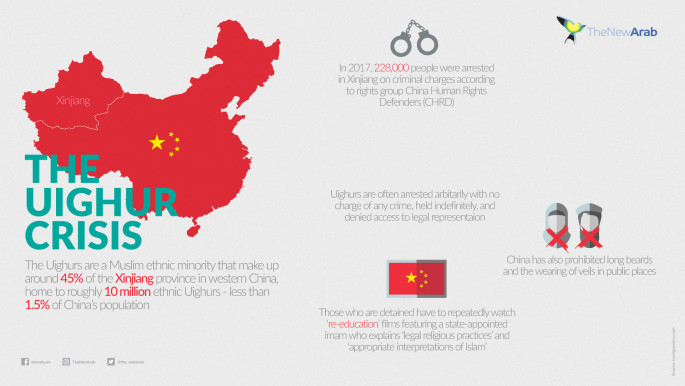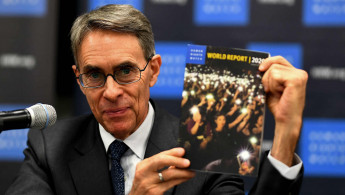EXCLUSIVE: Human Rights Watch Executive Director warns of 'bloodbath' in Idlib
Journalist Ibtisam Azem discussed the report's findings with director Kenneth Roth, charting the trends in global human rights as we leave behind 2019 and go forward into 2020.
Roth shares his views on the past years' biggest issues.
The focus of your annual report this year was China and in the reports introduction, which you wrote, you warned of "China's Global Threat to Human Rights". Why?
This year, we felt that it was necessary to highlight the danger posed by the Chinese government, not only to human rights in China, but also to human rights worldwide. Why? Because the Chinese government, in our view, relies on oppression to remain in power.
In light of slow economic growth, and as a reaction to it, China went further than usual in the use of its economic and diplomatic ability in exporting internal control abroad. Especially in terms of attacking United Nations organisations defending human rights, a matter which threatens the global system related to these rights.
Do you believe China's behaviour is unprecedented compared to other influential countries that have adopt the same approach?
Yes. We've not seen a government with this much economic power using all its sway to hit the credibility of those trying to establish human rights in different places around the world, and not just in its own country.
 |
|
| [Click to enlarge] |
Naturally, there are governments which fight back against the accusations levelled against them concerning human rights violations. Take, for example, the United States, which is attacking the International Court of Justice for its investigation into torture cases (by its forces) in Afghanistan, or, attacking the Human Rights Council in its investigation into Israel.
But even the US government supports efforts to establish human rights elsewhere in the world. The Chinese approach is different. It constitutes an organised opposition against any implementation of human rights (in international organisations) for fear that this will set a precedent that will then effect China.
If we then take into account the government's reliance on persecution to stay in power, we have this direct attack on the international human rights system.
You mentioned in the report, as well as during the press conference for its launch in New York, the silence of Arab and Muslim countries regarding the persecution of Chinese Muslims and their detention in concentration camps. Could you elaborate?
China persecutes the largest number of Muslims in its detention centres - nearly a million. The situation has reached a point in which it is forcing some of them to leave their religion... and the Organisation of Islamic Cooperation (OIC) hasn't even offered a serious reaction.
Ironically, the OIC issued a statement praising China for guarding the rights of the Muslim minority, which is madness!
 |
Muslim-majority countries have allowed themselves to be "bought" by Beijing, and now they have left their Muslim brothers in the camps in China. |  |
What has happened is that Muslim-majority countries have allowed themselves to be "bought" by Beijing, and now they have left their Muslim brothers in the camps in China.
I hope that changes, and in this sense we have noticed some change coming from countries such as Indonesia, Malaysia, Turkey, Albania, Qatar and Gambia. These countries are beginning to express their concern.
Criticism has been levelled at UN Secretary-General, Antonio Guterres, for not denouncing the situation in China, and his generally weak stance when it comes to criticising powerful nations. How do you see his performance compared to his predecessors?
We had high hopes on the selection of Antonio Guterres as the Secretary-General of the United Nations, because he headed the organisation's refugee organisation, suggesting he was well aware of people's concerns. But, today he represents a disappointment.
He is not prepared to speak frankly when influential countries commit human rights violations. He uses general and empty terms that do not highlight persecution, nor puts pressure on countries that practice it, as though nothing has happened. He is conducting diplomacy behind closed doors, but we have not seen any fruitful results.
|
In comparison, it can be said that (former Secretary-General of the United Nations) Kofi Annan showed that he held a position of influence and was an important voice for the promotion of human rights situations.
What do you think about the human rights situation regarding the position of European countries on immigration to Europe through Libya?
We have held a very critical position on the Italian government in this regard, and the European Union in general, on their actions concerning the Libyan coast guard - where migrants were returned to nightmare detention camps in Libya, in terms of human trafficking, gender, working conditions, and so on.
The Italian government was aware that returning migrants to Libya constituted an illegal measure due to the appalling conditions of their detention. So what they did was fund the Libyan coast guard to do this indirectly.
In addition, NGO ships that attempted to rescue immigrants at risk (in the waters of the Mediterranean) were attacked. This produced a strategy which led to people being left to their own fate and drowning.
The departure of Matteo Salvini (leader of the far-right Lega Nord party) from power in Italy presents an opportunity to rethink this inhuman approach to refugees and migrants who hope to reach Europe via Libya.
How do you assess the Iraqi government's handling of the popular uprising in the country?
We are very concerned about the situation in Iraq, including the use of excessive force and live bullets by Iraqi forces against demonstrators.
We have seen a new wave of protests in Iraq and Lebanon, and even in Iran. In Lebanon, there is change on the way, although we do not know where it will lead, and in Iraq too. In these two countries, Iraq and Lebanon, there is concern over Iranian influence, although its extent and form are different in each country.
 |
There is a feeling among Iraqis that their government does not serve the people, but rather Iran's interests. |  |
The extent of Iranian influence in Iraq in particular has led to widespread discontent, because there is a feeling among Iraqis that their government does not serve the people, but rather Iran's interests.
We've seen demonstrations quiet some with the death of (Iranian "Quds Force" commander) Qasem Soleimani on orders of the US, but they were reinvigorated and intensified… with the downing of the Ukrainian plane.
|
Regarding Syria and human rights in Syria, how do you assess the current situation?
Our main priority or concern at the moment is related to the Idlib governorate in northern Syria, where 3 million civilians are trying to avoid the indiscriminate shelling of Russian and Syrian (regime) aircraft.
We have seen how Russia and the Syrian regime are bombing civilian targets, including hospitals, and we are very concerned that this will lead to a bloodbath in the province.
Read more: Syrian regime used banned cluster missiles in school strikes, says HRW
We are trying to push the Europeans, Turks, and others to exert pressure on (Bashar) Assad, who depends on (Russian President Vladimir) Putin to fight in this war.
So, the key is in Putin's hand as to whether or not the area will see a massacre of civilians. There were several ceasefires, but none of them lasted. We have to stop this dynamic. We do not claim that the fighters in Idlib are innocent, many of them are "jihadists", but fighting against them does not mean bombing civilians.
What are your expectations for Yemen? Do you think the fighting parties feel "tired" from a war in which none of them have achieved victories on the ground?
I think there are signs of progress in Yemen. In my opinion, the many criticisms levelled at the Saudi-led coalition and its military campaigns in the country have had an impact.
This campaign has killed innocent people, targeting hospitals, a school bus, and more. In addition, the siege, especially in northeastern Yemen and around Al-Hodeida (the western coast), has resulted in the loss of many innocent lives and left nearly 11 million Yemenis in need of humanitarian aid.
Because of these criticisms, the United Nations is investigating war crimes. Also, a number of European countries have imposed an arms embargo. All this puts pressure on the coalition, and we now see the withdrawal of the Emirates, and even Sudan, which has provided a large number of fighters.
Gradually, Saudi Arabia sees that it is leading the war by itself without forces on the ground, a reality that forces Riyadh to seek a solution through negotiations.
How do you believe the election of US President Donald Trump will impact human rights violations in occupied Palestine?
There is no doubt that US President Donald Trump has diminished the credibility of the United States and its defence of human rights, especially after his continued praise of a number of dictators around the world.
Regarding Israel, Trump gave Israeli Prime Minister Benjamin Netanyahu the green light to continue his practices in violation of international law, including settlement expansion, which is illegal and constitutes a war crime under Article IV of the Geneva Conventions. Now, he threatens to annex the occupied territories (settlements in West Bank and Jordan Valley).
 |
Do you want to have two states, or one country that either gives everyone equal rights or functions as an apartheid regime? |  |
I recently returned from there, and many talk about the reality of one state, and this puts Israel on a crossroads: Do you want to have two states, or one country that either gives everyone equal rights or functions as an apartheid regime? The Israelis are trying to keep the ball in their court with discussions about peace talks.
But these talks do not exist, and the question: Do they want to give equal rights to all, or do they want to have an apartheid regime? They do not want to answer this question.
Read more: Israel's Netanyahu renews West Bank annexation pledge ahead of third election
There is, without a doubt, systematic and blatant discrimination, especially in the West Bank and East Jerusalem. On the one hand, there are the Palestinians who cannot move and build and so on and who have restrictions imposed on their basic rights. All of these are major violations of their basic rights.
Then on the other hand, there are the Israelis and the settlements where they enjoy full rights. This situation cannot continue.
Ibtisam Azem is a Palestinian writer and journalist. She works as a senior correspondent for Al-Araby Al-Jadeed newspaper in New York.
Follow her on Twitter: @IbtisamAzem
Follow us on Twitter and Instagram to stay connected.





 Follow the Middle East's top stories in English at The New Arab on Google News
Follow the Middle East's top stories in English at The New Arab on Google News



This is an edited version of the interview published in our Arabic sister publication, Al-Araby al-Jadeed, accessible on this link.